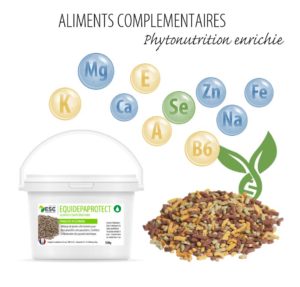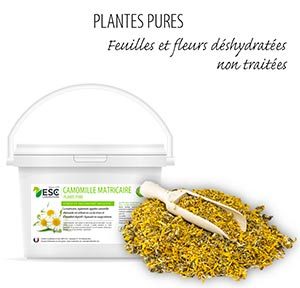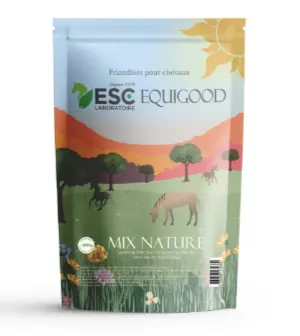Understanding digestive sensitivity in horses
The horse is a non-ruminant nomadic herbivore. When he's in the meadow, he spends half his time eating while walking. Not ruminant, the horse compensates for digestive insufficiency by almost continuous consumption of fodder. Indeed, the specificity of its digestive system lies in its least ability to digest fodder. This is due to the length of its digestive tract (nearly 130m!) and the role of the intestinal flora in the terminal portion of the digestive system. With only one rather small stomach (15 to 18L), the horse is forced to ingest little food at once but permanently (it can spend more than half the day eating)
Very fragile on the digestive level, therefore, the feeding of the horse must be properly adapted to its activity, its living environment, its age... This being said, you must never opt for a change too fast diet in order to allow the intestinal flora time to adapt. The gradual integration of new foods into the diet will always be a priority. A deficient intestinal flora can in fact be a source of severe problems such as slurry, colic, falling immune system... And remember, domestication is the 1st.and Colic factor in the horse!
Our natural solutions to help your horse digest better
We offer a wide range of products in solid or liquid form based on plant actives intended for the digestive comfort of your horse. Find the one that suits him best according to his needs and lifestyle.
To help you, here are our most requested products:
Gastromix: a mixture of 10 plants selected for their soothing properties during gastric acidity and digestive spasms. Gastromix helps strengthen the intestinal flora and maintain the general state.
Dietary clay: clay rich in nutrients and kaolin adapted to digestive disorders. Food clay is recognized for its ability to absorb digestive tract toxins
https://www.esclaboratoire.com/boutique/poultry-poultry extracts/clay-food/clay-food/
Curcuma digest: supplement formulated based on liquid vegetable extracts (Curcuma, Sage, Peppermint) and juiced aloe vera. Curcuma Digest helps relieve sensitive stomachs and digestive problems of horses.
Psyllium: plant rich in mucilages that forms a lubricant gel in the intestine. This plant is recommended in horses that live on sandy grounds.
To help your horse digest better, we also offer the following products: Flax seeds, lithothamne, equicarbocel, juice d'aloe vera, chamomile, vegetable charcoal, turmeric, equidigest flora, active yeast, meliss, peppermint, equidepaprotect, armoise
Make the right product choice
| What's the problem? | What kind of horse can be concerned or at risk? (not all inclusive) | What product? |
| Sensitive digestion and digestive spasm | Horses with an aggressive character, horses with a diet rich in cereals, horses living mainly in boxes... | Gastromix
Melissa Peppermint Camomille Curcuma Curcuma digest Flaxseed |
| Gastric acidity | Stressed horses, horses with a diet too rich in cereals, horses subject to long and prolonged efforts, horses whose intestinal flora has been degraded... | Lithothamne
Juice Curcuma digest |
| Ulcer voltages | Stressed horses, horses with a diet too rich in cereals, horses subject to long and prolonged efforts... | Lithothamne
Curcuma digest Equiulcemac Active yeast |
| Straw caps | Horses living in box on straw and especially those who tend to eat with greed... | =>Consult your veterinarian first |
| Stress colic | Horses that show signs of colic and live in boxes... | Psyllium (preventive)
Flaxseed (preventive) |
| Sand colic | Horses with signs of colic and living on sandy grounds... | Psyllium (preventive)
Flaxseed (preventive) |
| Diarrhoea | Horses subject to digestive bacteria, stressed horses, horses affected by deterioration of intestinal flora, foals whose digestive process is not yet stabilized | Vegetable coal
Equicarbocel |
| Intestinal parasitis | All horses (living in the meadow or box) | Equidepaprotect
Arms
|
| Intestinal flower | Horses that change their diet, change their environment, have difficulty taking up state or chewing (old horses)... | Beer yeast
Equidigest flora Active yeast |
These advices do not replace the advice of your veterinarian.
Maintenance treatments and synergies for your horse's digestive comfort
To prevent risks, you can do maintenance treatments (intestinal flower + detox + gastric mucosa protection) 3 times a year
- Maintenance of the intestinal flora: Prefer beer yeast
- Gastric acid protection: Complete the ration with lithothamne
- Protection of the gastric mucous membranes: Give juice from aloe vera









